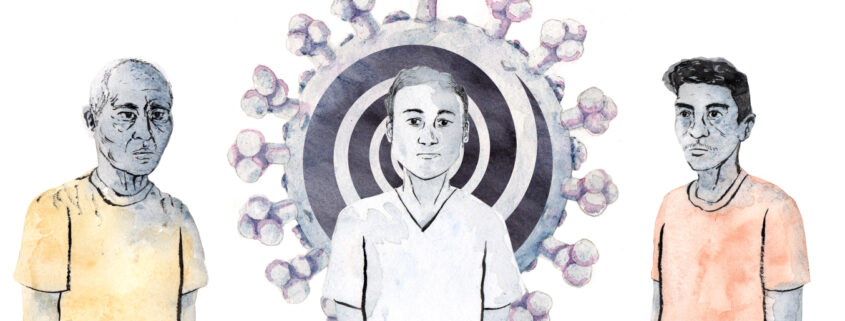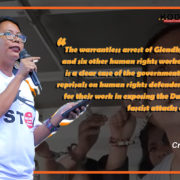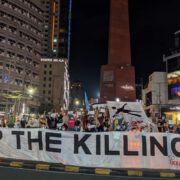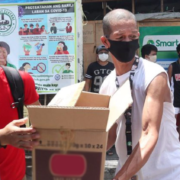Hidden Victims of the Pandemic: The Old Man, the Jail Aide, and the Convict
Three persons deprived of liberty describe how inhuman conditions in the country’s jails and prisons are placing them at greater risk amid the Covid-19 pandemic.
Here are their accounts as told to Aie Balagtas See. The images, drawn by Alexandra Paredes, are artistic renderings inspired by PCIJ file photos of prisoners from various jails.
By Aie Balagtas See/Philippine Center for Investigative Journalism
“All prison detention cells are Covid-free. That is the safest place right now,” Interior Secretary Eduardo Año said in late March, projecting an air of certainty even as the coronavirus pandemic raged. More than a month later, Año’s statement has become demonstrably false.
As of this writing, 716 inmates in city jails throughout the country have tested positive for the virus. In New Bilibid Prison (NBP), the national penitentiary in Muntinlupa, 140 inmates have been infected with the disease, and 12 deaths have so far been attributed to Covid-19. The Correctional Institution for Women in Mandaluyong has recorded 82 positive cases, with three deaths.
The lack of mass tests, the highly infectious nature of the virus, the lack of protective equipment and proper healthcare, and the inhuman overcrowding at Philippine jails and prisons are a potentially deadly combination.
On condition of anonymity, three “persons deprived of liberty” talked to the Philippine Center for Investigative Journalism (PCIJ) in May, speaking out against the impossibility of physical distancing and the shortage of resources in prison and jail cells. The “minimum health standards” imposed outside are nonexistent. Worse, there seems to be a lack of empathy from the people who are supposed to take care of them.
Because they are locked away from the rest of society, inmates and detainees in prison and jail cells are the hidden victims of the Covid-19 pandemic. Here are their stories.

We’re dead,” the old man thought when he first learned of Covid-19 infections. Illustration by Alexandra Paredes
A. The Old Man (Quezon City Jail)
The inmates were getting ready for jail breaks. Our situation in Quezon City Jail has been tense since the coronavirus breached our walls in the last week of March.
We held a noise barrage that month. It used to be calmer here. No one complained even though it was unusual that many of us suffered from high fever in February and early March. One day, we found out that an empleyada tested positive for coronavirus.
That’s when paranoia kicked in.
Empleyada or empleyado, that’s how we call the jail guards. We only learned about her case through media reports. We were kept in the dark about our real situation here.
No one bothered to explain her condition to us. The jail guards left us guessing about our safety. We were left guessing about our lives. Days after the news broke, a fellow inmate died.
Nine more inmates who came in close contact with him later tested positive for the virus.
We were angry. We eventually found out that the empleyada works in the paralegal office where e-Dalaw or the inmates’ Skype sessions with their families were held.
That tells you that she came in close contact with a lot of inmates. I wouldn’t be surprised if all of us got infected. The only way to find out is through massive testing.
‘We’re dead’
An inmate who came in close contact with the empleyada was isolated as jail administrators waited for her results to come out. On the eighth day of his quarantine period, the inmate was sent back to our dorm. We don’t know why he didn’t complete 14 days in isolation. He ate with us, slept beside us. He did practically everything with us. Then the empleyada’s results came. Positive, it said. The jail guards went to our dorm and picked him up for another round of quarantine.
Most of us were in disbelief. As the inmate walked out of our dorm, it got us thinking: Are they really killing us here? Or are they just incompetent?
When I first learned of the Covid-19 infections, one thing crossed my mind: We’re dead.
We’re dead because social distancing is a UFO (unidentified flying object) here. Experts say maintaining physical distance is the best weapon against this virus. For a jail facility that’s nearly 500 percent congested, no matter how you look at it, social distancing is alien.
Let me tell you why I don’t trust their system here.
One of the quarantine facilities was on the floor reserved for tuberculosis (TB) patients. Can you imagine that? You’re breathing TB from that entire floor. If you have ordinary colds and cough, you might get tuberculosis instead of getting cured.
Now, no one wants to admit they are sick over fears that jail guards will send them to the TB floor.
How do they check us for symptoms? They ask: “Do you have cough, cold, fever or flu?” They want to know if we have diarrhea. If we answer “no” to all their questions, that’s it.
Every move, a peso sign
Usually, a plastic screen separates the jail nurse from us.
The empleyados have personal protective equipment. Not an inch of their skin is exposed while the detainees assisting them, called the orderlies, wear only face masks. The orderlies are the real first line of defense. They attend to inmates before jail nurses do.
Earlier this year, my daughter bought me two blister packs of flu medicines. They ran out before I could even take one. I had to give them to my sick dormmates because they couldn’t ask from the clinic.
Most of my dormmates had flu symptoms at that time, but I heard the clinic ran out of supplies. Sometimes, it’s hard to ask medicines from the empleyado. If you know someone from the clinic, your connection might save your life.
Otherwise, you have to buy. Every move you make requires a peso sign. You’re dead if you don’t have money, especially if you’re facing grave charges.
Receiving government provisions is like an awarding ceremony. They need photographs for the tiniest thing they give you. They give you a blister pack of vitamins, they take pictures. They give you a bar of soap, they take pictures.
They always need to take pictures as if these were trophies they would mount on walls.
But everything is a lie. They don’t take good care of us. They don’t even come near those in quarantine areas. They stay outside the bars that separate them from the inmates.
In response to that, I would reach out to grab them whenever they asked me how I felt. It always made them flinch and step backwards. It’s so funny! I do that just to see how they’d react.
I don’t feel we are being treated as humans here.
Hopeless, helpless
Inside jails, you are tormented by the thought that you can’t do anything. People want to complain but can’t. They don’t know how, and they are afraid.
Inside jails, you feel hopeless and helpless.
Hopeless because you are under their rule. It’s like a military camp. What the empleyado wants, the empleyado gets.
Helpless because there are no real safety measures. There are no standard procedures for quarantine.
This is why I decided to speak up. I want things to change – from quarantine and precautionary measures to the attitude of the empleyado nurse.
Once, a medical aide said a sick detainee needed attention. The empleyado answered back: “Bahala silang mamatay pabayaan mo lang sila (let them die).”
With that attitude from a government nurse, how will you feel?
Why are we put in such conditions?
We’re presumed innocent until proven guilty. We should not be placed in these life-threatening conditions. We still have the right to life.
Tormented
Tension between jail guards and inmates subsided when the government started releasing detainees in April. Some days they released 20 inmates, some days they released five, 10 or 38.
It’s a slow process but at least they’re doing something to address the problem.
On April 19, the jail started segregating the elderly from the general population.
Old men, like me, were taken to administrative offices previously occupied by jail personnel. One of the offices was the paralegal office! It was the office where the empleyada who tested positive for Covid-19 was assigned.
In one of the facilities, 11 people shared two gurneys and a stretcher. Sick inmates who recently died used to occupy those makeshift hospital beds. I don’t know if they have been disinfected.
After all the deaths and infections here, information remains scarce. They’re not telling us anything. Don’t we deserve to know the truth so we can also protect ourselves?
Like me, I’m already 60 years old. My immune system is weak.
For now, I take things one step at a time. I have this mindset that I will never wait for my release anymore. It will torment you if you wait for it. But at night, I sleep wishing that I can get out.
I wish I could benefit from the Supreme Court petition that was filed on behalf of detainees. When the courts sent me here earlier this year, I didn’t have colds and cough. Now I have it. I’m afraid that if they don’t do anything, I will die here in a few days.

B. The Jail Aide (Quezon City Jail)
We badly need mass testing. I am one of the orderlies in Quezon City Jail. The old man and I are concerned that many of us are infected with Covid-19 already.
We don’t have sufficient information about what’s happening. They’re not telling us anything. I don’t know why. Maybe, they don’t want us to panic?
In March or February, we ran out of paracetamol after detainees with fever inundated the clinic.
Our Covid-19 prevention measures are also terrible! I’m one of those who assist jail doctors and nurses in the clinic. Those I work with are protected with proper medical equipment. Me? I attend to patients wearing only a glove and a face mask to protect myself.
In April, they relieved me of my duties when I went down with high fever. I really thought I would die. I had convulsions. I’ve been in quarantine ever since.
I think I’m Covid-19 positive as I have all the symptoms, but until now, I have never been swabbed for a test.
No physical distance
They placed me in isolation together with other sick inmates, which meant that if I had the virus, other inmates would catch it too.
Because it’s impossible to maintain physical distance, our line of defense against coronavirus is our immune system.
Even that is far-fetched.
Why? Because our food is terrible. Sometimes, we have longganisa (native sausage) for lunch for five straight days. For dinner, they always serve soup with vegetable. Sometimes our rice supply is half-cooked. Sometimes it’s burnt.
With lack of proper food and exercise, boosting our immune system is next to impossible.

C. The Convict (New Bilibid Prison)
More people are dying in New Bilibid Prison every day. It is as if there’s a typhoon of dead bodies raining all over us.
This May, more than 100 inmates died. That number is unprecedented. It’s the first time I have seen something like that since I arrived here 20 years ago.
Many of them died of pneumonia and other respiratory problems. However, there were no tests that would confirm them as Covid-19 patients.
We are scared of many things. We are scared of contracting the virus, but we are also scared of getting thrown inside isolation wards.
Prison doctors will isolate you if they think you have symptoms. We don’t want to be in further isolation. This fear prompts inmates to lie about their real health condition. The truth is, many of us are sick.
The NBP has three camps: the maximum, medium, and minimum security compounds. The isolation areas are located inside these facilities. They are different from the newly built “Site Harry” where Covid-19-positive patients from the Bureau of Corrections were put in quarantine or treated. Site Harry is located beside the medium security camp.
We are scared but we can’t do anything. Gang bosses might wring our necks if we complain. Speak up and face the risk of being locked up in a bartolina (isolation cell).
We have to wear masks wherever we go. Prison guards and gang leaders are strictly implementing this policy outside our dorms.
Ironically, we can remove our masks inside our dorms during bedtime. Covid-19 must be having a grand time inside our walls!
‘Their lives matter’
There’s no way to gauge what’s plaguing us, for sure. There’s no massive testing among inmates for the virus that has already killed one of us.
I can only assume.
Uncertainty is our enemy. Only one thing is clear to me: NBP is not Covid-19-free and we may contract the virus anytime. Dying of Covid-19 seems only a matter of time.
We are scared for the prison guards, too. They also need attention. They need to be tested, and tested rigorously.
Should guards die, they would be called heroes. The government would hail them as frontliners who risked their lives for public safety. Their lives matter.
But when we, the inmates, die, we will be reduced to nothing but ashes that our families can retrieve from crematoriums for a hefty price of P30,000.
We know that the virus is a problem everywhere. All we’re asking for is a health care system that caters to everyone, including us.
We’re humans too. #
***
Postscript:
A spokesman for the Bureau of Jail Management and Penology (BJMP) confirmed to the PCIJ that the female staff of Quezon City Jail who tested positive for Covid-19 was part of the “e-Dalaw operation,” but said her participation was limited to planning the inmates’ schedules. Detainees held a noise barrage after finding out that the empleyada had caught the disease, but the “commotion” was pacified and jail staff and inmates have since maintained open communication with each other, the spokesman claimed.
The BJMP did not respond to queries on whether suspected Covid-19 cases were isolated on the same floor as tuberculosis patients. –PCIJ, June 2020
Aie Balagtas See is a freelance journalist working on human rights issues. Follow her on Twitter (@AieBalagtasSee) or email her at [email protected] for comments.
Alexandra Paredes is a graphic designer and artist. Her design practice spans social impact, corporate collaterals, teaching, writing, and commissioned art. Find her online at alexandraparedes.com.
Paredes’s illustrations are fictional representations of the old man, the jail aide, and the convict. These are artistic renderings inspired by PCIJ file photos of prisoners.







